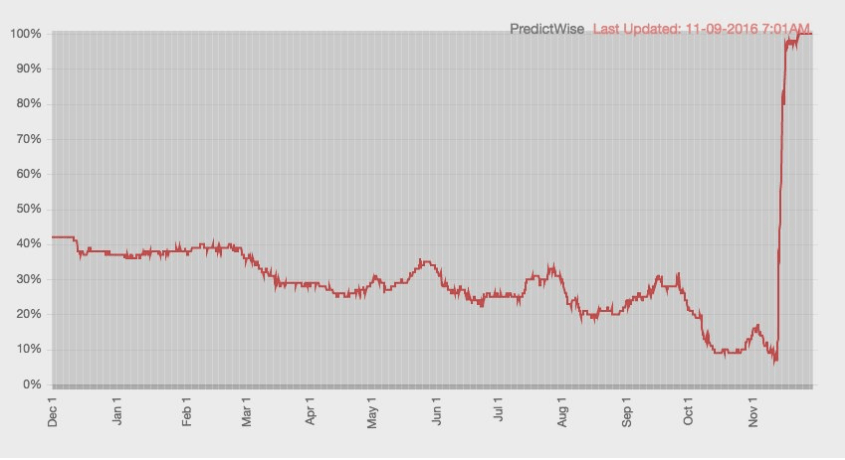What We’re Reading
Here are a few good articles the Collaborative Fund team came across this week.
Odds
The betting odds on whether Donald Trump would win the election is a good example of how unpredictable a world we live in:

Limitations
Jordan Cooper writes a good piece on burnout:
Burnout is when you kept pushing your body and your mind to move forward…into a series of successive cuts…for so long…that you are too damaged to appreciate the pleasure and joy of moving forward at all…it’s like you’ve trained yourself to expect pain from forward movement…and therefore it’s not so much that you fear moving forward…as it is that you revert back to not feeling as you step…and that’s a pretty inertial place to be. Burn out is numbness.
Purpose
Julie Hanna wrote a wonderful article on profit and purpose:
“Our goal is to produce as much value for the world as possible. Period,” he says. “Purpose is the point. Profit is the result. It’s the natural order of things. Greater value creation leads to more profit than trying to maximise profit as an endgame.”
Entertainment
Ted Leonsis defines what Netflix is:
“You pay $8-$12 a month for schmuck insurance. For the price of one movie ticket, you can get every movie that you won’t watch and will occasionally get some episodic, cool, original content. I’ve been paying $8 or $12 a month for Netflix for 10 years. I can’t remember the last time I watched a movie, but it’s schmuck insurance and it’s hard to cancel, and it’s just become a utility. I want it and I need it.”
Persuasion
Josh Brown looks at media’s role in Trump’s election:
Thousands of reporters and opinion writers generating millions of pieces of content. And it didn’t matter at all. Changed nothing. They threw everything they had at Trump for a year and a half and, in the end, people just went and did what their gut told them to.
I’m very sorry to say this to my friends and colleagues in the media but here’s the truth: the echo chamber of Twitter is not at all representative of what goes on in the real world. Mostly, it’s just journalists, professional “thought leaders”, public intellectuals and celebrities stroking each other in a 21st century version of the Parisienne salon. “Read my take on this and then I’ll read yours!”
Book: The Birth of Plenty by William Bernstein
Lots of books write about where we’re going next. Bernstein – one of the great investment thinkers of our day – writes about how we got here. This is a highly readable look at the factors that make an economy grow, and the history of what brought them to be. I loved lines like this:
A critical fact in the world of 1801 was that nothing moved faster than the speed of a horse. No human being, no manufactured item, no bushel of wheat, no side of beef, no letter, no information, no idea, order or instruction of any kind moved faster. Nothing had moved any faster, and, as far as Jefferson’s contemporaries were able to tell, nothing ever would.
Have a great weekend.